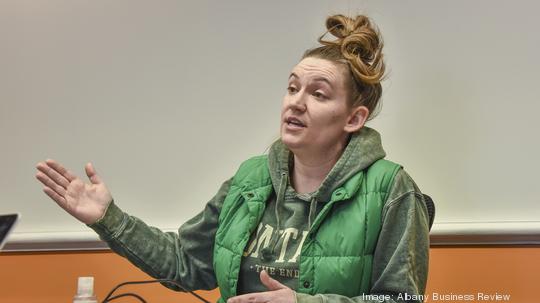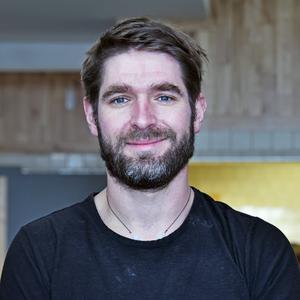
Each year, 108 billion pounds of food — 40% of what's produced — is wasted in the U.S. Noelle Dommasch has left behind her first career as an English teacher to make a dent in that massive number, at least in the Albany region, with a new compost startup.
Dommasch plans to sublease a roughly 1,650-square-foot warehouse space from garden supplier Organica inside the former Honest Weight Food Co-op building at 484 Central Ave. in Albany. She wants to outfit it with expensive machines from Spain that she says produce high-quality compost more efficiently.
She says her business — called Viridian — is a much-needed solution to a "great crisis" in the Capital Region.
"Albany is unique in that it's located with a landfill right in the city of Albany.” Dommasch said, noting the landfill is near capacity. “We have a real problem here, and the citizens are going to pay for that when we have to truck it out across New York state, and it's just not something I want for the future of my community."
The lion's share of that waste comes from large-scale operations, like grocery stores and restaurants, which dispose of unsold food. And once food waste is in a landfill, it releases harmful methane gas.
"We're now in this terrible cycle where it's cheaper to throw it away, so we're doing that because there's no alternative,” Dommasch said.
Dommasch currently picks up food waste from small restaurants in the region and composts it traditionally. Once the Central Avenue space is set up, she plans to move that operation indoors.
There are two of the composting machines operating in Spain, so she's taking a trip in April to see them in action. She’s expecting to receive the machines next month, though that could change with ongoing global supply chain issues.
The machines work by continually mixing the compost, which feeds more oxygen to the microbes and promotes decomposition. Because the operation is indoors, the company can compost year-round and have better control of compost conditions, making the production faster and higher quality, she said.
Having those machines will also allow the company to compost "compostable" silverware and packages, which aren't actually compostable with traditional operations.
Once Dommasch has the quality where she wants, she plans to sell the resulting product. There's a push to get away from synthetic fertilizers, so producing more compost would be a solution, she said.
"If you want to be an organic farm, you can use our product because we don't use chemicals. We just use banana peels and other things people throw away,” Dommasch said. "We always talk about farm-to-table, but we really reconnect table to farm."
Down the line, she plans to expand the operation into a larger space, which will enable her to take on larger loads of food waste from grocery stores.
Starting in June 2021, large businesses that produce a lot of food waste were required to donate waste to charities or recycle it if there's a compost company within 25 miles. Because that requirement is so new, there aren't many organic recyclers in the area, she said.
Startup costs for a small operation are around $50,000. An expanded operation would take about $500,000. Dommasch is working on securing grants and plans to seek investment once a small operation is set up.
Ideally, she would like to just operate the facility and work with a transportation company to pick up food scraps. The plan is to have employees down the road.
Dommasch started her professional composting journey with a startup in Glenville called BioSoil Farm that was founded in 2017. It had gotten some investment and a bit of traction but ultimately failed, primarily because the two main founders wanted to take the company in different directions, she said.
“We kind of fell into the pitfalls of the usual startup,” she said.
Now, she’s taking what she learned there – plus from her certification as a "master composter" from Cornell University – and trying again.
One of the things she learned is to not accept too much food waste too fast.
"You don't really know food waste until you're shoveling it. It's hard to conceptualize a ton of food waste."



